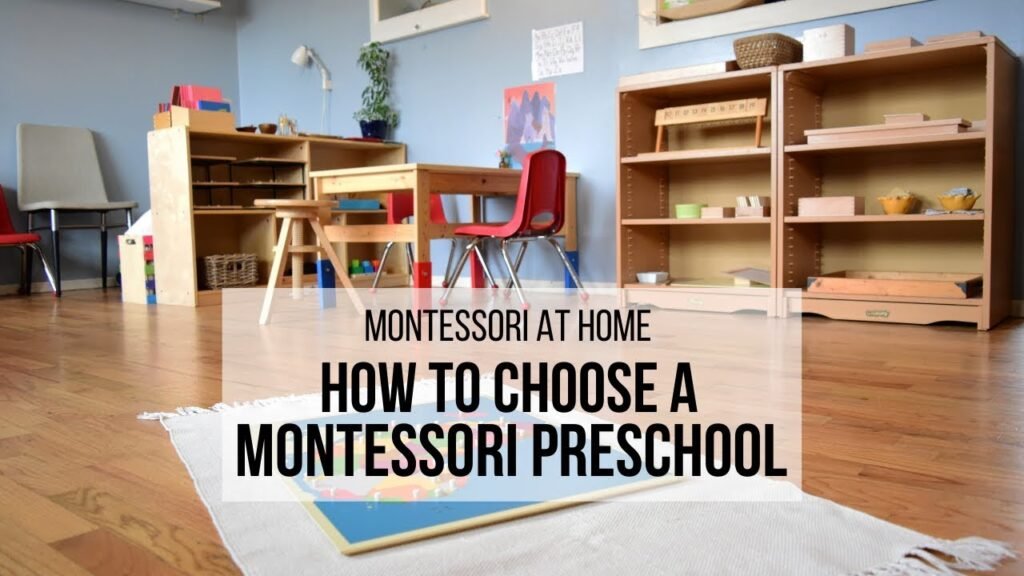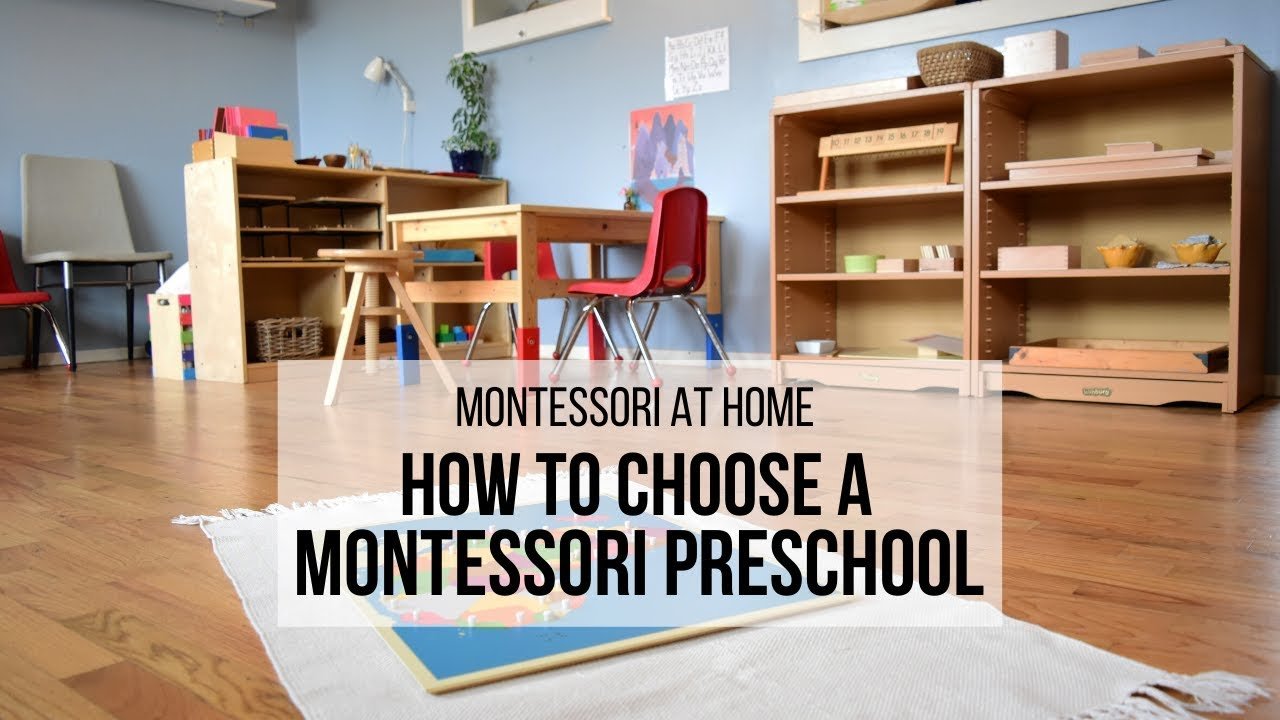When looking for a high quality Montessori preschool for your child, there are key attributes you should be mindful of. Dr. Montessori did not patent her practices, so schools can label themselves as Montessori without adhering to her philosophies. It is important to take a tour of the school before enrolling your child, and to check if the school is listed in the American Montessori Society or Association Montessori International database. Additionally, ensure that the school campus is safe and clean, with materials in the classroom being orderly, easily accessible, and including classic Montessori materials. Look for child-sized furniture, tables, chairs, and materials for practical life activities. Certified Montessori teachers should have credentials from accredited programs like AMI or AMS, and they should act as facilitators in guiding children’s learning process.
The ideal Montessori classroom should have children engaged in self-selected activities, active learning, and a full 3-hour work cycle. Focus on independence, self-sufficiency, and confidence in children is key in Montessori education, which encourages children from an early age. Mixed age groups allow younger children to learn from older ones and vice versa. It is crucial to carefully vet potential Montessori schools to ensure they align with Dr. Montessori’s philosophies in order to provide the best educational environment for your child.
Key Attributes to Look for When Choosing a High-Quality Montessori Preschool
Choosing a suitable preschool for your child is a significant decision that can shape their early years and educational foundation. For parents interested in a Montessori approach, finding a high-quality Montessori preschool is essential. Here are some key attributes to look for when selecting a Montessori preschool that aligns with your child’s needs and values.

Take a Tour of the School Before Enrolling Your Child
Before enrolling your child in a Montessori preschool, it is crucial to visit the school in person. Taking a tour allows you to see the environment where your child will spend their time and interact with the teachers and staff. By observing the classrooms, you can gain insight into the school’s philosophy, atmosphere, and approach to education. A firsthand look at the school will help you make an informed decision about enrolling your child.
Check if the School is Listed in the American Montessori Society or Association Montessori International Database
A reputable Montessori preschool will likely be listed in the American Montessori Society (AMS) or Association Montessori International (AMI) database. These organizations set high standards for Montessori education and accreditation. Schools that are affiliated with AMS or AMI adhere to authentic Montessori principles and practices, ensuring a high-quality educational experience for your child.
Ensure the School Campus is Safe and Clean
The safety and cleanliness of the school campus are paramount when choosing a Montessori preschool. A well-maintained environment promotes a sense of security and reduces distractions, allowing children to focus on learning and exploration. Be sure to assess the facilities, outdoor spaces, and overall hygiene to ensure a safe and healthy setting for your child’s development.
Materials in the Classroom Should Be Orderly and Easily Accessible
A hallmark of Montessori education is the use of carefully curated materials that promote hands-on learning and independent exploration. When visiting a Montessori preschool, look for classrooms with orderly and accessible materials that are inviting to children. Classic Montessori materials, such as the Pink Tower, Brown Stairs, and practical life activities, should be prominently displayed to engage and stimulate young learners.
Look for Child-Sized Furniture, Tables, and Chairs
Child-sized furniture plays a crucial role in creating a child-centered environment that fosters independence and autonomy. Montessori classrooms feature tables, chairs, and workstations designed to accommodate young children’s physical size and developmental needs. By providing furniture tailored to children’s proportions, a Montessori preschool supports kids in taking ownership of their learning and activities.
Materials for Practical Life Activities Should Be Present
Practical life activities are central to the Montessori method, teaching children essential life skills and promoting independence and self-sufficiency. Look for a Montessori preschool that offers a range of practical life materials, such as pouring, spooning, and food preparation tools, to empower children to engage in purposeful activities that enhance their daily living skills.
Montessori Emphasizes the Concept of Children Having an Absorbent Mind
Dr. Maria Montessori believed that children possess an absorbent mind, a unique ability to learn effortlessly and absorb their surroundings like sponges. Montessori education capitalizes on this innate quality by providing a rich sensory environment filled with hands-on materials that cater to children’s natural curiosity and eagerness to explore. A high-quality Montessori preschool recognizes and nurtures the absorbent mind of each child, fostering a love for learning and discovery from an early age.
Ideal Montessori Classroom Should Have Children Engaged in Age-Appropriate Activities
In a well-designed Montessori classroom, children are actively engaged in age-appropriate activities that cater to their individual interests and developmental stage. Observing children working quietly, focused, and absorbed in purposeful tasks is a sign of a productive and harmonious learning environment. An ideal Montessori preschool encourages children to explore, create, and learn at their own pace, setting the stage for a lifelong love of learning.
Presence of Mixed Age Groups Allows for Peer Learning and Mentorship
One of the unique features of a Montessori classroom is the presence of mixed-age groups, where children of varying ages work together in a collaborative and supportive setting. Younger children benefit from observing and learning from older peers, while older children develop leadership skills and empathy by mentoring younger classmates. This dynamic peer learning environment fosters cooperation, socialization, and a sense of community among children of different ages.
Certified Montessori Teachers Should Have Credentials from Accredited Programs
Montessori teachers play a pivotal role in guiding children’s learning experiences and facilitating their growth and development. When choosing a Montessori preschool, ensure that the teachers are certified professionals with credentials from reputable Montessori teacher training programs such as AMI or AMS. Certified Montessori teachers understand and embody the principles of Montessori education, acting as mentors and guides who support children in their learning journey.
Montessori Teachers Act as Facilitators of Learning and Promote Self-Directed Exploration
In a Montessori classroom, teachers take on the role of facilitators who encourage children to explore, discover, and learn independently. By creating a prepared environment with engaging materials, Montessori teachers empower children to make choices, pursue their interests, and develop critical thinking skills. Through self-directed exploration and hands-on experiences, children in a Montessori preschool learn at their own pace and take ownership of their education.
Children in a Montessori Classroom Should Be Engaged in Self-Selected Activities and Active Learning
A hallmark of Montessori education is the emphasis on child-centered learning, where children actively engage in self-selected activities that align with their interests and abilities. In a high-quality Montessori preschool, children have the freedom to choose their work, explore different materials, and participate in hands-on learning experiences. Active learning, curiosity, and intrinsic motivation drive children’s engagement, leading to meaningful discoveries and a deeper understanding of concepts and skills.
Montessori Education Encourages Independence, Self-Sufficiency, and Confidence in Children
Central to the Montessori philosophy is the belief in nurturing children’s independence, self-sufficiency, and confidence from a young age. Through a focus on practical life skills, hands-on learning opportunities, and a supportive environment, Montessori education empowers children to develop essential life skills, problem-solving abilities, and a positive self-image. By fostering independence and instilling a sense of autonomy, Montessori preschools prepare children to become self-reliant, resilient, and confident individuals.
Montessori at Home Series Provides Practical Tips for Implementing Montessori Philosophies at Home
For parents interested in incorporating Montessori principles into their home environment, the Montessori at Home series offers practical tips, resources, and ideas for implementing Montessori philosophies at home. By applying Montessori principles such as independence, self-directed learning, and hands-on exploration in a home setting, parents can create a supportive and enriching environment that nurtures children’s natural curiosity, creativity, and love of learning. The Montessori at Home series serves as a valuable resource for busy parents seeking to integrate Montessori practices into their daily routines and support their child’s development and growth.
In conclusion, selecting a high-quality Montessori preschool entails considering various key attributes that align with the principles and values of Montessori education. By taking a thorough approach to researching and visiting potential schools, parents can make an informed decision that promotes their child’s learning, development, and well-being. A quality Montessori preschool provides a nurturing, child-centered environment that supports children’s natural abilities, fosters independence, and cultivates a lifelong love of learning. When choosing a Montessori preschool, look for schools that prioritize safety, cleanliness, authenticity, and a child-centric approach to education, ensuring a positive and enriching early childhood experience for your child.

